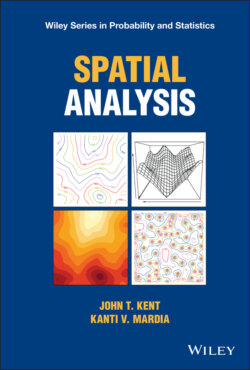Читать книгу Spatial Analysis - Kanti V. Mardia - Страница 2
Table of Contents
Оглавление1 Cover
2 Title Page
3 Copyright
4 Dedication
5 Dedication
6 List of Figures
7 List of Tables
8 Preface
9 List of Notation and Terminology
10 1 Introduction 1.1 Spatial Analysis 1.2 Presentation of the Data 1.3 Objectives 1.4 The Covariance Function and Semivariogram 1.5 Behavior of the Sample Semivariogram 1.6 Some Special Features of Spatial Analysis Exercises
11 2 Stationary Random Fields 2.1 Introduction 2.2 Second Moment Properties 2.3 Positive Definiteness and the Spectral Representation 2.4 Isotropic Stationary Random Fields 2.5 Construction of Stationary Covariance Functions 2.6 Matérn Scheme 2.7 Other Examples of Isotropic Stationary Covariance Functions 2.8 Construction of Nonstationary Random Fields 2.9 Smoothness 2.10 Regularization 2.11 Lattice Random Fields 2.12 Torus Models 2.13 Long‐range Correlation 2.14 Simulation Exercises
12 3 Intrinsic and Generalized Random Fields 3.1 Introduction 3.2 Intrinsic Random Fields of Order 3.3 Characterizations of Semivariograms 3.4 Higher Order Intrinsic Random Fields 3.5 Registration of Higher Order Intrinsic Random Fields 3.6 Generalized Random Fields 3.7 Generalized Intrinsic Random Fields of Intrinsic Order 3.8 Spectral Theory for Intrinsic and Generalized Processes 3.9 Regularization for Intrinsic and Generalized Processes 3.10 Self‐Similarity 3.11 Simulation 3.12 Dispersion Variance Exercises
13 4 Autoregression and Related Models 4.1 Introduction 4.2 Background 4.3 Moving Averages 4.4 Finite Symmetric Neighborhoods of the Origin in 4.5 Simultaneous Autoregressions (SARs) 4.6 Conditional Autoregressions (CARs) 4.7 Limits of CAR Models Under Fine Lattice Spacing 4.8 Unilateral Autoregressions for Lattice Random Fields 4.9 Markov Random Fields (MRFs) 4.10 Markov Mesh Models Exercises
14 5 Estimation of Spatial Structure 5.1 Introduction 5.2 Patterns of Behavior 5.3 Preliminaries 5.4 Exploratory and Graphical Methods 5.5 Maximum Likelihood for Stationary Models 5.6 Parameterization Issues for the Matérn Scheme 5.7 Maximum Likelihood Examples for Stationary Models 5.8 Restricted Maximum Likelihood (REML) 5.9 Vecchia's Composite Likelihood 5.10 REML Revisited with Composite Likelihood 5.11 Spatial Linear Model 5.12 REML for the Spatial Linear Model 5.13 Intrinsic Random Fields 5.14 Infill Asymptotics and Fractal Dimension Exercises
15 6 Estimation for Lattice Models 6.1 Introduction 6.2 Sample Moments 6.3 The AR(1) Process on 6.4 Moment Methods for Lattice Data 6.5 Approximate Likelihoods for Lattice Data 6.6 Accuracy of the Maximum Likelihood Estimator 6.7 The Moment Estimator for a CAR Model Exercises
16 7 Kriging 7.1 Introduction 7.2 The Prediction Problem 7.3 Simple Kriging 7.4 Ordinary Kriging 7.5 Universal Kriging 7.6 Further Details for the Universal Kriging Predictor 7.7 Stationary Examples 7.8 Intrinsic Random Fields 7.9 Intrinsic Examples 7.10 Square Example 7.11 Kriging with Derivative Information 7.12 Bayesian Kriging 7.13 Kriging and Machine Learning 7.14 The Link Between Kriging and Splines 7.15 Reproducing Kernel Hilbert Spaces 7.16 Deformations Exercises
17 8 Additional Topics 8.1 Introduction 8.2 Log‐normal Random Fields 8.3 Generalized Linear Spatial Mixed Models (GLSMMs) 8.4 Bayesian Hierarchical Modeling and Inference 8.5 Co‐kriging 8.6 Spatial–temporal Models 8.7 Clamped Plate Splines 8.8 Gaussian Markov Random Field Approximations 8.9 Designing a Monitoring Network Exercises
18 Appendix A Mathematical Background A.1 Domains for Sequences and Functions A.2 Classes of Sequences and Functions A.3 Matrix Algebra A.4 Fourier Transforms A.5 Properties of the Fourier Transform A.6 Generalizations of the Fourier Transform A.7 Discrete Fourier Transform and Matrix Algebra A.8 Discrete Cosine Transform (DCT) A.9 Periodic Approximations to Sequences A.10 Structured Matrices in Dimension A.11 Matrix Approximations for an Inverse Covariance Matrix A.12 Maximum Likelihood Estimation A.13 Bias in Maximum Likelihood Estimation
19 Appendix B A Brief History of the Spatial Linear Model and the Gaussian Process Approach B.1 Introduction B.2 Matheron and Watson B.3 Geostatistics at Leeds 1977–1987 B.4 Frequentist vs. Bayesian Inference
20 References and Author Index
21 Index
22 Wiley End User License Agreement
